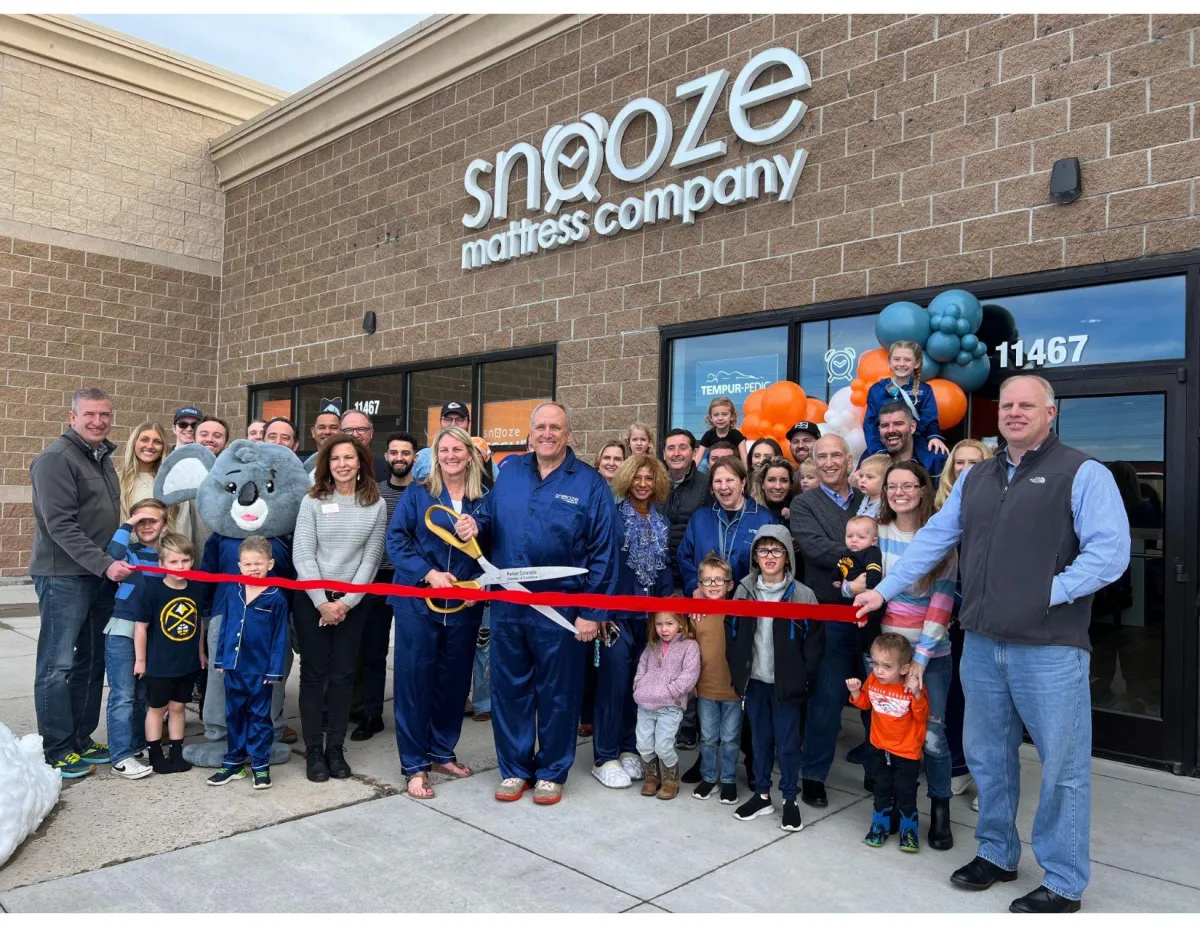Now franchising in UK & Ireland!
Now franchising in UK & Ireland!

Become a Snooze Mattress franchise owner today!
**This website is not for the sale of mattresses. If you are looking for mattresses or employment, please head to Snoozemattresscompany.com
We're Waking up a tired industry.
Start your journey with Snooze today!
Make a positive impact on the health and well-being of your community; all while taking hold of your future, putting your money to work, and making freedom your reality!
“You can trust this guy (Matt Smith, CEO), he is amazing, amazing human being, great family man, and a great business man”
-Grant Cardone, Business Mogul, Founder of the 10X Movement
What's Holding You Back From Your Entrepreneurial Dreams?
We know that starting your own business can seem daunting, but with Snooze we’re with you every step of the way.
At Snooze Mattress Company, we're here to give you a stress-free opportunity to take control of your career and make a positive difference in the health of your community!
Step into a booming $74 billion industry with a franchise model built for momentum. At Snooze Mattress Company, we’ve simplified the path to business ownership offering a lean operational setup, low overhead, and powerful margins that put your profits where they belong: in your hands.
With us, you’re never on your own. From grand opening to grand growth, our seasoned team is by your side with expert training, proven marketing strategies, streamlined systems, and hands-on support that fuels customer traffic and long-term success.
This isn’t just another franchise. It’s your chance to own a purpose-driven business that helps people sleep better and live better. Your future’s wide awake
and it starts with Snooze.

Only Requires 2 Employees
High Profit Margins
Everyone in your city is a customer!
$50B Global Market
Improve the health of others!
Localized Marketing
Low Volume for Success

A team with over a 40yrs. of mattress expertise
Support in Marketing, Operations, Logistics, Design and Sales
Online and in-person training
Dynamic CEO who went from Zero to $5.5M in 90 days with Grant Cardone

Elite Retailer of Tempur-Pedic
Sealy
Stearns and Foster
Nectar
DreamFit
Malouf
BedGear
And Many More

Snooze Dream Mapping Technology
Shows Customers their pressure points and pinpoints the best sleep solution
Technology trusted by the Mayo clinic

Business Model For Success
Only Requires 2 Employees
High Profit Margins
Everyone in your city is a customer!
$50B Global Market
Improve the health of others!
Localized Marketing
Low Volume for Success

Supportive Franchise System
A team with over a 40yrs. of mattress expertise
Support in Marketing, Operations, Logistics, Design and Sales
Online and in-person training
Dynamic CEO who went from Zero to $5.5M in 90 days with Grant Cardone

Strategic Partnerships
Elite Retailer of Tempur-Pedic
Sealy
Stearns and Foster
Nectar
DreamFit
Malouf
BedGear
And Many More

Successful Sales Process
Snooze Dream Mapping Technology
Shows Customers their pressure points and pinpoints the best sleep solution
Technology trusted by the Mayo clinic
How To Get Started
1
Step 1: Click any one of our booking buttons and fill out the form so we collect your information get in touch with you for your 20min info call.
2
Step 2: Schedule your meeting. After filling out the contact form, you'll be redirected to a calendar to schedule your 20-minute over-the-phone meeting with our development team.
3
Step 3: Meet with your Snooze representative for your 20-minute phone call to see if this will be a good fit for both of us.
That's it!
If we decide that you'll be a good fit with Snooze Mattress Company, our team will help you to become a franchisee within 6 to 8 weeks!
Book an Appointment
No Obligations. No Pressure. No applications on the first meeting.
At Snooze Mattress Company, we are on a mission to help the world sleep deep and dream big. We understand the importance of deep restorative sleep in achieving personal and professional success. That's why we offer a proven franchise model that not only allows you to become a successful business owner but also help people live healthier and achieve the quality sleep they deserve.
See where it started and find out first hand from current franchisees how Snooze impacted their lives.
The Full Story of Grant Cardone and Matt Smith!
Testimonial with Nathan Phillips | Franchising with Snooze Mattress Co.
Keith Chambers Franchisee Story!
Jim Mince Franchisee Story!
Testimonial with Mike Baue | Franchising with Snooze Mattress Company
Frequently Asked Questions
What are the qualifications to become a Snooze Franchisee?
In order to qualify to become a Snooze Mattress Company Franchisee you will need $50,000 Liquid Cash, and Minimum Net Worth $250,000.
What if I do not qualify but I want to become a Snooze Franchisee?
We have a pool of investors we can connect you with in order to find a business partner whom is also interested in Snooze Mattress Company. Just put your information in and let our consultant know your situation and they will guide you through the process.
Where can I book my 20min phone call to become a Snooze Franchisee?
You can click on any of the links throughout our website to schedule your 20min phone call!
Learn more about Snooze through our Stories!

A Comprehensive Guide to Franchise Disclosure Documents
Embarking on the journey of owning a franchise involves navigating through various legal and business intricacies. Among the essential documents in this process is the Franchise Disclosure Document (FDD). This comprehensive guide aims to demystify the FDD, shedding light on its purpose, contents, and significance in the world of franchising.
What is an FDD?
The Franchise Disclosure Document, commonly known as the FDD, is a legal document that franchisors are obligated to provide to prospective franchisees before the sale of a franchise. Governed by federal and state regulations in the United States, the FDD serves as a valuable resource for individuals considering franchise ownership.
Key Components of an FDD:
1. Cover Page:
- Provides basic information about the franchisor and the franchise opportunity.
2. Table of Contents:
- Outlines the structure of the FDD for easy reference.
3. Item 1: The Franchisor and Its Predecessors:
- Offers details about the franchisor's business history, executives, and any legal or bankruptcy issues.
4. Item 2: Business Experience:
- Highlights the experience of the franchisor's key personnel in the franchise industry.
5. Item 3: Litigation:
- Discloses any history of legal actions involving the franchisor.
6. Item 4: Bankruptcy:
- Provides information on the franchisor's bankruptcy history.
7. Item 5: Initial Fees:
- Outlines the initial franchise fee and any other fees payable to the franchisor.
8. Item 6: Other Fees:
- Details ongoing fees, such as royalties, advertising fees, and other charges.
9. Item 7: Estimated Initial Investment:
- Breaks down the estimated costs involved in setting up and operating the franchise.
10. Item 8: Restrictions on Sources of Products and Services:
- Describes any restrictions on where the franchisee can purchase goods and services.
11. Item 9: Franchisee's Obligations:
- Outlines the responsibilities and obligations of the franchisee.
12. Item 10: Financing:
- Provides information on financing options, if available, through the franchisor.
13. Item 11: Franchisor's Assistance, Advertising, Computer Systems, and Training:
- Describes the support and resources provided by the franchisor.
14. Item 12: Territory:
- Specifies the territory granted to the franchisee.
15. Item 13: Trademarks:
- Discusses the franchisor's trademarks and the franchisee's right to use them.
16. Item 14: Patents, Copyrights, and Proprietary Information:
- Details any intellectual property owned by the franchisor.
17. Item 15: Obligation to Participate in the Actual Operation of the Franchise Business:
- Clarifies whether the franchisee is required to personally operate the business.
18. Item 16: Restrictions on What the Franchisee May Sell:
- Specifies any restrictions on the products or services offered by the franchisee.
19. Item 17: Renewal, Termination, Transfer, and Dispute Resolution:
- Addresses the terms and conditions related to the renewal, termination, and transfer of the franchise.
20. Item 18: Public Figures:
- Discloses whether public figures are associated with the franchise.
21. Item 19: Financial Performance Representations:
- Optional section providing information about the actual or potential financial performance of the franchise.
22. Item 20: Outlets and Franchisee Information:
- Provides details about the franchisor's existing outlets and franchisees.
23. Item 21: Financial Statements:
- Presents the franchisor's audited financial statements.
24. Item 22: Contracts:
- Includes copies of the agreements the franchisee will be required to sign.
25. Item 23: Receipts:
- Acknowledges that the franchisee received the FDD.
The Significance of the FDD:
1. Informed Decision-Making:
The FDD equips prospective franchisees with the information needed to make informed decisions about joining a specific franchise system.
2. Legal Compliance:
Franchisors are legally obligated to provide the FDD, ensuring transparency in the franchise sales process and compliance with regulatory requirements.
3. Risk Assessment:
By delving into the FDD, potential franchisees can assess the risks and rewards associated with a particular franchise opportunity.
4. Negotiation and Due Diligence:
The FDD serves as a foundation for negotiation and due diligence, allowing franchisees to better understand the terms and conditions of the franchise agreement.
In the complex landscape of franchising, the Franchise Disclosure Document stands as a vital tool for both franchisors and franchisees. Its role in fostering transparency, facilitating due diligence, and promoting informed decision-making underscores its significance in shaping the dynamics of franchise relationships. Aspiring franchisees are encouraged to carefully review the FDD and seek professional advice to navigate the path to franchise ownership successfully.

A Comprehensive Guide to Franchise Disclosure Documents
Embarking on the journey of owning a franchise involves navigating through various legal and business intricacies. Among the essential documents in this process is the Franchise Disclosure Document (FDD). This comprehensive guide aims to demystify the FDD, shedding light on its purpose, contents, and significance in the world of franchising.
What is an FDD?
The Franchise Disclosure Document, commonly known as the FDD, is a legal document that franchisors are obligated to provide to prospective franchisees before the sale of a franchise. Governed by federal and state regulations in the United States, the FDD serves as a valuable resource for individuals considering franchise ownership.
Key Components of an FDD:
1. Cover Page:
- Provides basic information about the franchisor and the franchise opportunity.
2. Table of Contents:
- Outlines the structure of the FDD for easy reference.
3. Item 1: The Franchisor and Its Predecessors:
- Offers details about the franchisor's business history, executives, and any legal or bankruptcy issues.
4. Item 2: Business Experience:
- Highlights the experience of the franchisor's key personnel in the franchise industry.
5. Item 3: Litigation:
- Discloses any history of legal actions involving the franchisor.
6. Item 4: Bankruptcy:
- Provides information on the franchisor's bankruptcy history.
7. Item 5: Initial Fees:
- Outlines the initial franchise fee and any other fees payable to the franchisor.
8. Item 6: Other Fees:
- Details ongoing fees, such as royalties, advertising fees, and other charges.
9. Item 7: Estimated Initial Investment:
- Breaks down the estimated costs involved in setting up and operating the franchise.
10. Item 8: Restrictions on Sources of Products and Services:
- Describes any restrictions on where the franchisee can purchase goods and services.
11. Item 9: Franchisee's Obligations:
- Outlines the responsibilities and obligations of the franchisee.
12. Item 10: Financing:
- Provides information on financing options, if available, through the franchisor.
13. Item 11: Franchisor's Assistance, Advertising, Computer Systems, and Training:
- Describes the support and resources provided by the franchisor.
14. Item 12: Territory:
- Specifies the territory granted to the franchisee.
15. Item 13: Trademarks:
- Discusses the franchisor's trademarks and the franchisee's right to use them.
16. Item 14: Patents, Copyrights, and Proprietary Information:
- Details any intellectual property owned by the franchisor.
17. Item 15: Obligation to Participate in the Actual Operation of the Franchise Business:
- Clarifies whether the franchisee is required to personally operate the business.
18. Item 16: Restrictions on What the Franchisee May Sell:
- Specifies any restrictions on the products or services offered by the franchisee.
19. Item 17: Renewal, Termination, Transfer, and Dispute Resolution:
- Addresses the terms and conditions related to the renewal, termination, and transfer of the franchise.
20. Item 18: Public Figures:
- Discloses whether public figures are associated with the franchise.
21. Item 19: Financial Performance Representations:
- Optional section providing information about the actual or potential financial performance of the franchise.
22. Item 20: Outlets and Franchisee Information:
- Provides details about the franchisor's existing outlets and franchisees.
23. Item 21: Financial Statements:
- Presents the franchisor's audited financial statements.
24. Item 22: Contracts:
- Includes copies of the agreements the franchisee will be required to sign.
25. Item 23: Receipts:
- Acknowledges that the franchisee received the FDD.
The Significance of the FDD:
1. Informed Decision-Making:
The FDD equips prospective franchisees with the information needed to make informed decisions about joining a specific franchise system.
2. Legal Compliance:
Franchisors are legally obligated to provide the FDD, ensuring transparency in the franchise sales process and compliance with regulatory requirements.
3. Risk Assessment:
By delving into the FDD, potential franchisees can assess the risks and rewards associated with a particular franchise opportunity.
4. Negotiation and Due Diligence:
The FDD serves as a foundation for negotiation and due diligence, allowing franchisees to better understand the terms and conditions of the franchise agreement.
In the complex landscape of franchising, the Franchise Disclosure Document stands as a vital tool for both franchisors and franchisees. Its role in fostering transparency, facilitating due diligence, and promoting informed decision-making underscores its significance in shaping the dynamics of franchise relationships. Aspiring franchisees are encouraged to carefully review the FDD and seek professional advice to navigate the path to franchise ownership successfully.
**This website is not for the sale of mattresses. If you are looking for mattresses or employment, please head to Snoozemattresscompany.com


